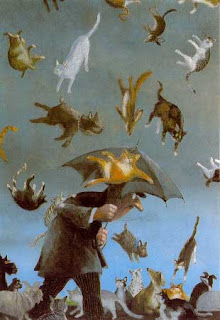 I believe many of my fellow classmates did not understand the metaphor because, like Dr. Strange pointed out, they take this class too seriously. Of course we should take it seriously because we are learning and growing as future educators, but Dr. Strange is going to give us fun assignments and we need to "loosen up" some while reading. Instead of just reading a blog post about how students need to take computers home and why they are not, we were able to read the same thing in a fun way. I believe students sometimes try so hard to write just what is expected from them though. They don't want to "think" and have fun while doing a homework assignment; they just want to get it over with and write what they think the lab assistants and Dr. Strange what to read. Maybe the classmates were just tired or maybe they did not want to "look stupid" if the post was really about pencils. It makes me wonder if the blog post was read to them or someone talked to them about the same thing, if they would have caught the metaphor. Maybe students did not actually "read" what he was saying in his post; they may have just skimmed it. Some students may be better at listening and "catching on" to the message.
I believe many of my fellow classmates did not understand the metaphor because, like Dr. Strange pointed out, they take this class too seriously. Of course we should take it seriously because we are learning and growing as future educators, but Dr. Strange is going to give us fun assignments and we need to "loosen up" some while reading. Instead of just reading a blog post about how students need to take computers home and why they are not, we were able to read the same thing in a fun way. I believe students sometimes try so hard to write just what is expected from them though. They don't want to "think" and have fun while doing a homework assignment; they just want to get it over with and write what they think the lab assistants and Dr. Strange what to read. Maybe the classmates were just tired or maybe they did not want to "look stupid" if the post was really about pencils. It makes me wonder if the blog post was read to them or someone talked to them about the same thing, if they would have caught the metaphor. Maybe students did not actually "read" what he was saying in his post; they may have just skimmed it. Some students may be better at listening and "catching on" to the message. I believe everyone has heard or used a metaphor at some point in their life. When actually listening to my friends talk, I realized that I use them probably multiple times a day. When I am talking about my pregnant cousin someone might say, "Yeah, she's got a bun in the oven." Now she doesn't literally have a "bun in the oven" (unless she is baking at that moment). Some more I have recently hear when paying attention, "It's raining cats and dogs outside!" "It's so hot; I'm on fire!" "She broke my heart" Every Friday when I am done visiting my granny and telling her bye, I will tell her I'll see her next week and she always responds with "If the good Lord willing and the creek don't rise." We always then laugh because it is such a funny, yet kind of morbid expression.
Metaphors are all around us. They are not going away either, nor do I want them to. In order to help my students learn and understand them, I will have them read books that have metaphors in it. We will then pause and question what we think the author really meant. I will also have them write metaphors themselves. Reading poetry would also be a great eye opener when learning about metaphors.
Metaphors make conversations and reading so much more fun. If anyone has read the New Testament in the Bible, they will see Jesus using metaphors constantly, especially about salt and light. "“You are the salt of the earth. But if the salt loses its saltiness, how can it be made salty again? It is no longer good for anything, except to be thrown out and trampled underfoot" (Matthew 5:13). Obviously Jesus isn't really saying we are literally a piece of salt. He is using a metaphor. Children grow up and go to Sunday school listening to metaphors without knowing it. So, why did even Jesus use metaphors? I believe because, like everyone else, children and even adults want to learn in fun ways. Metaphors make things so much more entertaining. Using and learning about this kind of writing and talking will make our students be "sharp as a tack."
No comments:
Post a Comment